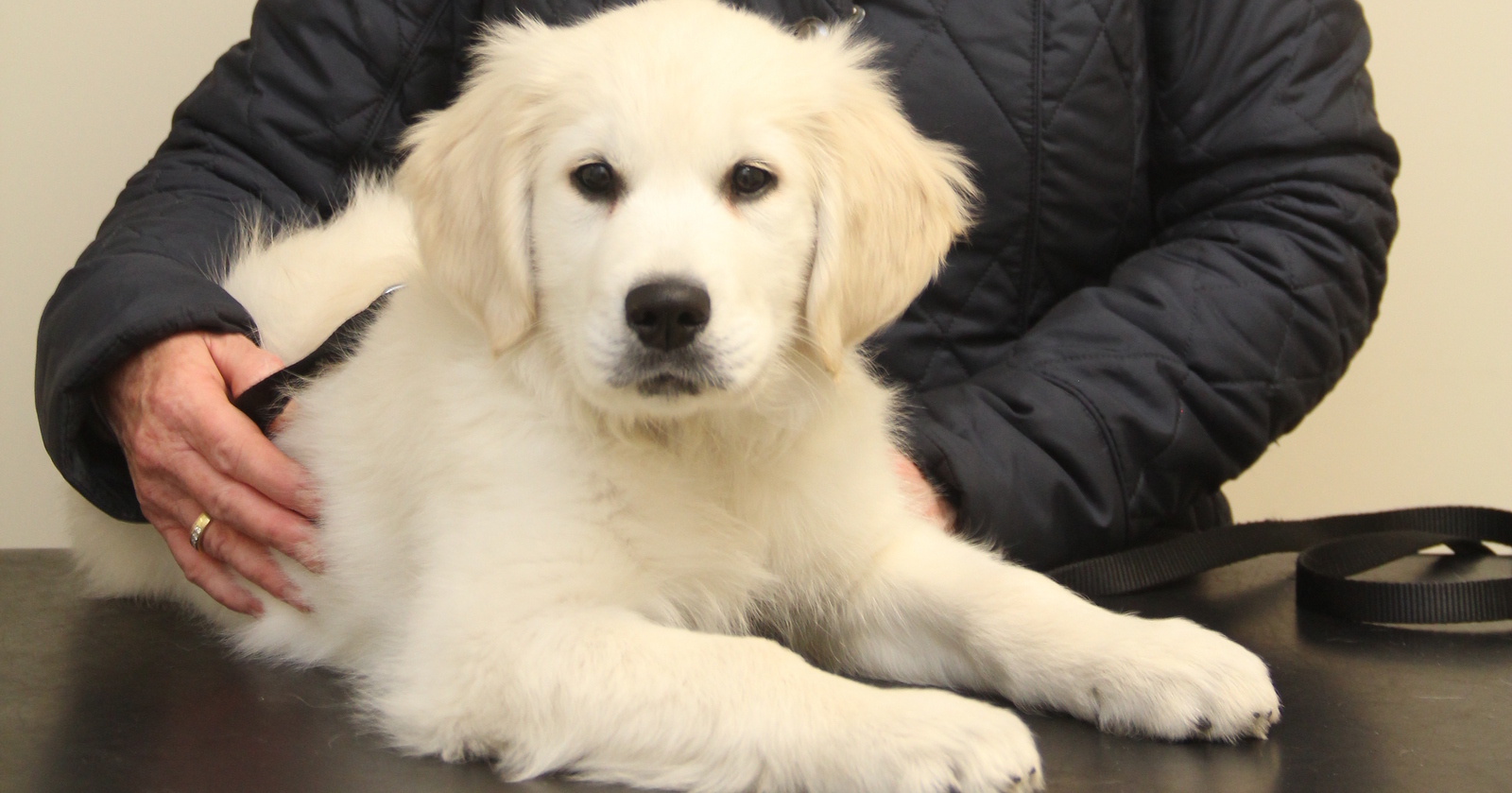When do golden retriever balls drop? It’s a question that many dog owners may have as they watch their adorable pups grow up. Well, fear not, because we’re here to shed some light on this curious topic.
As a young golden retriever goes through the stages of puppyhood, there comes a time when their testicles, commonly referred to as “balls,” begin to develop. This is a natural and important part of their growth and development.
Typically, male golden retriever puppies’ testicles begin to drop around the age of 2 to 4 months. However, it’s essential to note that every dog is unique, and the timing may vary slightly. So, if you’re eagerly waiting for those balls to drop, be patient and give your furry friend some time.
Now that you have a better understanding of when golden retriever balls drop, you can keep an eye out for this milestone in your pup’s development. Remember, as they continue to grow and mature, it’s vital to provide them with proper care, love, and attention. So, embrace this exciting journey with your furry companion!

When Do Golden Retriever Balls Drop?
Golden retrievers are known for their friendly and playful nature. As they mature, it is essential to understand the changes their bodies go through, including the dropping of their testicles, also referred to as “balls.” This article will provide detailed information about when golden retriever balls drop and what to expect during this stage of development.
1. Development of Testicles in Golden Retrievers
Golden retrievers are born with undescended testicles, which means their testicles are situated inside the abdominal cavity. At around two to three weeks of age, the testicles typically begin their descent towards the scrotum. This process is known as testicular descent or testicular migration. However, the timing of this descent can vary from one individual to another.
By the time a golden retriever puppy reaches six to eight weeks of age, the testicles should have descended into the scrotum. However, sometimes the descent may take a bit longer, up to several months. It is essential to monitor this process and consult a veterinarian if the testicles have not dropped by the time the puppy is four to six months old.
Important Note: If the testicles fail to descend into the scrotum by six to eight months of age, it is considered a medical condition called cryptorchidism. Cryptorchidism requires veterinary attention and may necessitate surgical intervention.
2. Signs of Dropped Testicles
Once a golden retriever’s testicles have descended into the scrotum, there are some noticeable signs of this stage of development. It is crucial to be aware of these signs to ensure the health and well-being of your furry friend.
Size: The scrotum will appear fuller and more prominent once the testicles have dropped. This is due to the presence of the testicles within the scrotal sac.
Palpation: It is possible to gently feel the individual testicles inside the scrotum once they have descended. However, it is important to approach this with caution and sensitivity, as excessive handling can cause discomfort or anxiety in your dog.
Behavior Changes: Some golden retrievers may display changes in behavior, such as increased playfulness or a higher energy level. This can be attributed to the surge in hormones associated with testicular development and maturation.
3. Benefits of Neutering and Timing Considerations
Neutering, or the surgical removal of the testicles, is a common procedure for male dogs, including golden retrievers. There are several benefits to neutering your golden retriever, including:
- Preventing unwanted litters
- Reducing the risk of certain health problems, such as testicular cancer and prostate disease
- Minimizing behavioral issues, such as aggression and marking behavior
- Eliminating the possibility of testicular torsion, a painful condition where the testicle becomes twisted
When it comes to the timing of neutering, it is generally recommended to wait until the testicles have fully dropped into the scrotum. This ensures that the surgery can be performed safely and effectively. The timing can vary depending on the individual dog, but it is typically recommended to wait until the golden retriever is around six to nine months old.
Consulting with a veterinarian is crucial to determine the best timing for neutering your golden retriever, taking into account their specific health, development, and breed characteristics.
4. Caring for Golden Retrievers During Testicular Development
While golden retrievers are going through testicular development, it is important to provide appropriate care to ensure their well-being and comfort.
Regular Veterinary Check-ups: Regular visits to the veterinarian are crucial during this period to monitor the progress of testicular descent and to address any health concerns or issues that may arise.
Proper Diet and Exercise: Providing a well-balanced diet and regular exercise is essential for the overall health of your golden retriever during this stage of development. Consult with your veterinarian for specific dietary recommendations based on your dog’s age, weight, and activity level.
Monitoring for Abnormalities: Keep a close eye on your golden retriever’s scrotum and testicles, looking out for any signs of swelling, discomfort, or abnormalities. If you notice anything concerning, seek veterinary attention promptly.
Understanding the Importance of Testicular Development in Golden Retrievers
Golden retrievers go through various stages of development, and understanding when their testicles drop is an important part of their overall care. By being aware of the typical timeline for testicular descent, recognizing the signs of dropped testicles, considering the benefits of neutering, and providing appropriate care during this period, you can ensure the well-being of your golden retriever and help them grow into a healthy and happy adult dog.
Tips for Ensuring Optimal Development and Care
Here are some additional tips to ensure the optimal development and care of your golden retriever during testicular development:
1. Socialization:
During this stage, it is crucial to expose your golden retriever to various social situations, people, and other animals to promote healthy socialization skills.
2. Training:
Implementing basic obedience training and positive reinforcement techniques will help your golden retriever develop good behavior and manners.
3. Exercise:
Regular exercise is vital for your golden retriever’s physical and mental well-being. Ensure they receive adequate exercise appropriate for their age and breed.
4. Dental Care:
Maintaining good dental hygiene is essential to prevent dental diseases. Regular tooth brushing and dental check-ups are recommended.
5. Preventive Healthcare:
Stay up to date with vaccinations, deworming, flea, and tick prevention, as recommended by your veterinarian.
6. Grooming:
Regular grooming, including brushing their coat and keeping their ears and nails clean, promotes a healthy and well-maintained appearance.
Golden Retriever Balls and Their Development: The Bottom Line
Knowing when golden retriever balls drop is an essential aspect of understanding the development of these beloved dogs. By familiarizing yourself with the stages of testicular descent, recognizing the signs of dropped testicles, and providing appropriate care, you can ensure the well-being and happiness of your golden retriever. Remember to consult with a veterinarian for personalized advice and guidance based on your dog’s specific needs.
Key Takeaways: When Do Golden Retriever Balls Drop
- Golden retriever testicles usually drop at around 6-8 weeks old.
- If your golden retriever’s testicles haven’t dropped by 6 months old, consult your veterinarian.
- A retained testicle can increase the risk of testicular cancer and other health issues.
- Neutering your golden retriever can help prevent potential problems associated with retained testicles.
- Regular check-ups with your veterinarian can ensure the health and well-being of your golden retriever.
Frequently Asked Questions
Welcome to our FAQ section all about golden retrievers! If you’re wondering when certain developmental milestones occur in these lovable pups, you’ve come to the right place. Below, you’ll find answers to some commonly asked questions related to golden retriever development.
1. When do golden retriever puppies start to lose their baby teeth?
Golden retriever puppies typically start to lose their baby teeth around three to four months of age. This process, known as teething, can be accompanied by discomfort or a desire to chew on objects. It’s important to provide appropriate chew toys during this stage to support healthy oral development and prevent them from chewing on items they shouldn’t.
By the time golden retrievers are six to seven months old, they should have all of their adult teeth. If you have concerns about your golden retriever’s teething or oral health, it’s always a good idea to consult with your veterinarian.
2. At what age do golden retrievers stop growing?
The growth rate of golden retrievers tends to slow down around the age of seven to ten months. However, it’s important to note that these dogs may continue to fill out and mature physically until they are about 18 to 24 months old.
While the height of a golden retriever is more or less established by the time they reach their first birthday, their bodies may still be filling out and gaining muscle mass during this time. Providing a balanced diet and regular exercise during their growth period is essential for ensuring they reach their full potential.
3. When do golden retrievers reach sexual maturity?
The age at which golden retrievers reach sexual maturity can vary between individuals, but it is typically around six to nine months. At this point, female golden retrievers may start having their first heat cycle, while male golden retrievers may begin displaying sexual behaviors.
It’s important to consider spaying or neutering your golden retriever to prevent unwanted pregnancies and certain health issues. Consult with your veterinarian to determine the best time for this procedure based on your dog’s specific needs and overall health.
4. How long does it take for golden retrievers to be fully house-trained?
The time it takes to fully house-train a golden retriever can vary depending on various factors such as consistency, patience, and the individual pup’s personality. On average, it can take four to six months for a golden retriever to become reliably house-trained.
To successfully house-train your golden retriever, it’s important to establish a consistent routine, provide positive reinforcement for desired behaviors, and be patient. Consistency is key, and accidents may happen along the way, so it’s important to stay consistent and avoid punishment as this can hinder the training process.
5. When do golden retrievers enter their senior years?
Golden retrievers are considered seniors around the age of seven to ten years. This is when they may start to experience age-related health issues and show signs of slowing down. However, with proper care and regular visits to the veterinarian, many golden retrievers can live happy and healthy lives well into their golden years.
It’s important to provide a senior golden retriever with a balanced diet, regular exercise, and appropriate modifications to their environment to support their comfort and overall well-being as they enter their senior years.

How late can a dogs testicle drop?
Summary
So, when do golden retriever balls drop? Well, it usually happens around 6 to 8 months of age. During this time, the testicles will descend into the scrotum.
It’s important to monitor this process because if the testicles don’t drop by 8 months, it could indicate an issue that requires veterinary attention. Remember to consult with a veterinarian to ensure the health and well-being of your furry friend.
